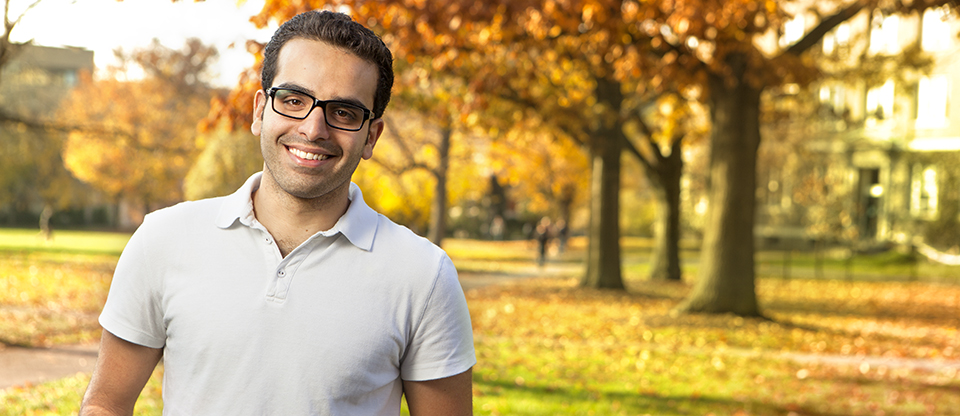
Class of 2014
If there’s something about Spenser Reed ’14—a slender, carefully modulated, and intense man of 23—that reminds you of a recent lottery winner holding back shouts of joy, it’s because being a student at Cornell University is his dream come true.
Five years ago, Reed was stuck home in bed, alone. “It was the most lonely three years of my life,” he says of his sophomore, junior, and senior years of high school in Clearwater, Florida. His insulin-dependent type 1 diabetes, coupled with a rare, debilitating autoimmune thyroid disorder, kept him in and out of the emergency room, out of school, and forced him to be homeschooled by tutors. “I was like an old man,” he says.
Making a medical life
That long period of illness and isolation strengthened his interest in health and medicine and inspired him to follow his mother’s footsteps into the medical profession. (His mother is an optometrist.)
“My mother is, in my opinion, the best medical professional in the world,” Reed says, describing the great care she shows for patients and how her patients, in turn, adore her. His mother emigrated from Sudan when she was 16, speaking not a word of English. She excelled in high school and put herself through college and graduate school.
So like many sick children, Reed became a witness to—and critic of—how medicine tends to be practiced.
“The problem,” Reed explains, “was that Western medicine didn’t really provide all of the tools for me to be functional. The underlying causes of my diseases were not addressed, which is why I was sick for so many years.” Reed finally got the personalized medical treatment needed when he and his family “did a lot of researching into integrative and functional medicine and looking at targeting specific clinically-relevant biomarkers.”
With somewhat improved health, he graduated from high school, but was not well enough to go very far away for college. And so he enrolled in St. Petersburg College, a nearby school that counts Jim Morrison of The Doors among its alumni.
At St. Petersburg, he blossomed. He earned an associate’s degree in molecular biology and genetics and, along the way, conducted National Institute of Health-supported research on HIV-associated dementia, co-authored a research paper published in Molecular Neurodegeneration, was elected president of the honors college consortium, and was named a National Science Foundation Scholar. In 2010, he was named one of the top 20 community college students in the country by USA Today, which featured him on a full-page ad.
Now in the first semester of his junior year, Reed is taking seven classes.
He has very little time to waste. “If I weren’t a science major,” he admits wistfully, “I would just take language classes for the rest of my life.” He regrets not having time to take a Spanish class, or Arabic, the language he speaks at home with his mom and younger sister, Victoria.
In the little free time he does have, Reed runs along campus paths, on trails through the woods, everywhere. He is something of a health nut, in fact, as many with chronic disease often are forced to be—always alert, paying diligent attention to what nutrients he eats and how much he exercises.
The science of health
Not surprisingly, Reed’s academic passion is connected to health. He is pursuing a double major in food science and nutritional science, with a concentration in molecular nutrition, and hopes to attend Weill Cornell Medical College after he graduates.
Alicia Orta-Ramirez, director of the undergraduate program in the Department of Food Science, is Reed’s advisor and one of the most influential people in his life at Cornell, through her friendship and mentorship. It was Orta-Ramirez who suggested Reed contact Elad Tako, an assistant professor and researcher with the Robert W. Holley Center for Agriculture and Health.
In Tako’s lab, which is supported by the USDA, Reed is part of the team assessing iron and zinc bioavailability in beans. He is now at work assessing zinc status in animals through erythrocyte fatty acid testing to determine the best crop varieties to use to improve zinc status in people.
“Spenser is training other students in our lab,” Tako reports. “His high standards, scientific curiosity, dedication, and sense of responsibility and leadership are remarkable.”
Last year, Reed took a class that intrigued him deeply—Natural Remedies and Ethnomedicines for Health, taught by Manuel Aregullin, a senior research associate in plant biology and molecular biology and genetics.
“I really became so interested,” says Reed. “He was talking about the future of medicine … for example, new types of research looking at plant compounds as lead compounds in the development of novel drugs to treat chronic diseases, compounds that are more efficacious and come with fewer side effects.”
In the summer of 2012, Reed applied and was accepted to an NIH-supported research program run by Aregullin.
“I take students during the summer for a couple of months to the Dominican Republic,” explains Aregullin, “to learn and study the many plant-based folk remedies for an extremely diverse array of diseases.”
For eight weeks, Aregullin, Reed, and a handful of other students were “in the middle of one of the most biodiverse places in the world.”
While there, Reed learned that he had been named a Hunter Rawlings III Presidential Research Scholar, a scholarship that provides an annual research stipend supporting undergraduate students’ projects with faculty advisors. With the scholarship, Reed is now working with Aregullin, assessing the phytochemistry and anti-diabetic properties of several Peruvian plants.





